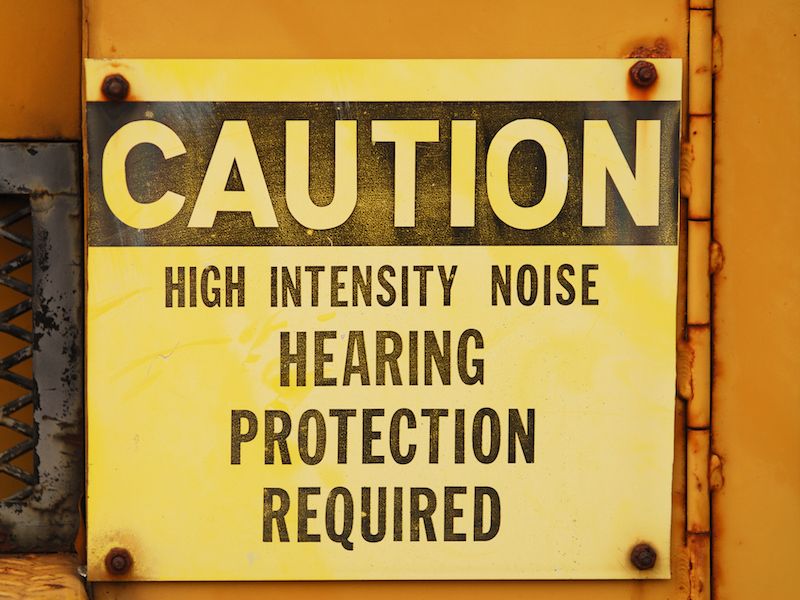
Realizing you need to protect your ears is one thing. Knowing when to protect your ears is another matter. It’s more challenging than, for example, recognizing when you need sunblock. (Is it sunny and are you going to be outside? Then you need sunscreen.) Even knowing when you need eye protection is simpler (Doing some hammering? Working with a saw or dangerous chemicals? Wear eye protection).
It can feel like there’s a significant grey area when dealing with when to use ear protection, and that can be risky. Unless we have particular information that some place or activity is dangerous we tend to take the easy path which is to avoid the issue altogether.
Determining The Risks
In general, we’re not very good at assessing risk, especially when it comes to something as intangible as lasting hearing problems or loss of hearing. Here are some examples to prove the point:
- Person A goes to a very loud rock concert. The concert lasts around 3 hours.
- A landscaping business is run by person B. She spends a significant amount of time mowing lawns, then she goes home to a quiet house and reads a book.
- Person C is an office worker.
You may believe the hearing hazard is higher for person A (let’s just call her Ann). Ann leaves the performance with ringing ears, and she’ll spend most of the next day, trying to hear herself speak. Assuming Ann’s activity was dangerous to her hearing would be reasonable.
The noise that person B (let’s just call her Betty), is exposed to is not as loud. There’s no ringing in her ears. So it must be less hazardous for her hearing, right? Not necessarily. Because Betty is mowing all day. So despite the fact that her ears don’t ring out with pain, the injury accrues gradually. If experienced on a regular basis, even moderately loud noises can have a damaging affect on your ears.
Person C (let’s call her Chris) is even less evident. Lawnmowers have instructions that indicate the dangers of persistent exposure to noise. But although Chris has a fairly quiet job, her long morning commute on the train each day is fairly loud. In addition, she sits at her desk and listens to music through earbuds. Does she need to give some thought to protection?
When You Should Think About Safeguarding Your Hearing
The standard rule of thumb is that if you have to raise your voice to be heard, your surroundings are loud enough to do damage to your ears. And you really should think about wearing earplugs or earmuffs if your surroundings are that loud.
The limit should be 85dB if you want to be clinical. Sounds above 85dB have the potential to result in damage over time, so in those situation, you need to think about wearing ear protection.
Your ears don’t have a built-in sound level meter to alert you when you get to that 85dB level, so most hearing specialists recommend getting special apps for your phone. You will be capable of taking the correct steps to safeguard your ears because these apps will tell you when the noise is getting to a hazardous volume.
A Few Examples
Even if you do get that app and take it with you, your phone might not be with you wherever you go. So we might establish a good baseline with a few examples of when to protect our ears. Here we go:
- Using Power Tools: You know that working every day at your factory job will call for ear protection. But what if you’re simply working in your garage all day? Even if it’s just a hobby, hearing specialists suggest using hearing protection if you’re using power equipment.
- Listening to music with earbuds. This one requires caution, more than protection. Pay attention to how loud the music is, how long you’re playing it, and whether it’s going directly into your ears. Noise-canceling headphones are a smart choice to steer clear of needing to turn the volume way up.
- Domestic Chores: Even mowing a lawn, as previously stated, necessitates hearing protection. Chores, including mowing, are most likely something you don’t even think about, but they can cause hearing damage.
- Driving & Commuting: Do you drive for Lyft or Uber? Or maybe you’re riding the subway after waiting for a little while downtown. The noise of living in the city is bad enough for your hearing, not to mention the extra damage caused by cranking up your music to drown out the city noise.
- Exercise: You know your morning spin class? Or maybe your daily elliptical session. All of these cases may call for hearing protection. Those trainers who use sound systems and microphones (and loud music) to motivate you might be good for your heart rate, but all that loudness is bad for your ears.
A good baseline may be researched by these examples. When in doubt, however, you should choose protection. In most cases, it’s better to over-protect your hearing than to leave them exposed to possible harm in the future. Protect today, hear tomorrow.
